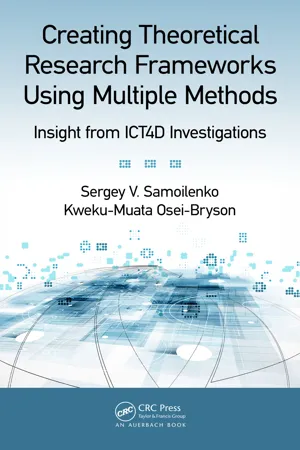
Creating Theoretical Research Frameworks using Multiple Methods
Insight from ICT4D Investigations
Sergey V. Samoilenko, Kweku-Muata Osei-Bryson
- 399 pages
- English
- ePUB (mobile friendly)
- Available on iOS & Android
Creating Theoretical Research Frameworks using Multiple Methods
Insight from ICT4D Investigations
Sergey V. Samoilenko, Kweku-Muata Osei-Bryson
About This Book
By now, it is commonly accepted that investments in information and communication technologies (ICTs) can facilitate macroeconomic growth in developed countries. Research standards in ICT for development (ICT4D) are high, and it is a basic expectation that a theoretically sound conceptual investigation should yield actionable results. An additional expectation is that an on-the-ground study conducted in each setting should add to the common body of knowledge based on theory. In other words, one is expected to make a connection between the world of concepts and the world of reality. Middle-range theories and frameworks could help connect the case studies with grand theories, by helping to create a theoretically sound and practically applicable research architecture of ICT4D.
This book demonstrates how creative use of various data analysis methods (e.g., data mining [DM], data envelopment analysis [DEA], and structural equation modeling [SEM]) and conceptual frameworks (e.g., neoclassical growth accounting, chaos and complexity theories) may be utilized for inductive and deductive purposes to develop and to test, in step-by-step fashion, theoretically sound frameworks for a large subset of ICT4D research questions. Specifically, this book showcases the utilization of DM, DEA, and SEM for the following purposes:
- Identification of the relevant context-specific constructs (inductive application)
- Identification of the relationships between the constructs (inductive application)
- Development of a framework incorporating the constructs and relationships discovered (inductive application)
- Testing of the constructed framework (deductive application)
The book takes a multi-theoretical perspective to economic development research. It starts with an overview of ICT4D. Next it covers such frameworks and theories as neoclassical growth accounting and the theory of complementarity, complex systems and chaos theories, and the product life cycle (PLC) theory. There are also nontechnical overviews of the DM and data analytic methods that can be used in this research. Also presented is evidence that human capital and investment capital are complementary and are reliable sources of economic growth. The book concludes with methodological frameworks to guide investment decisions and the formulation of strategic policy.